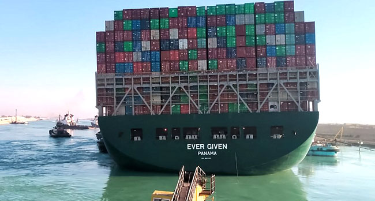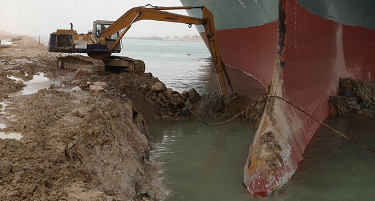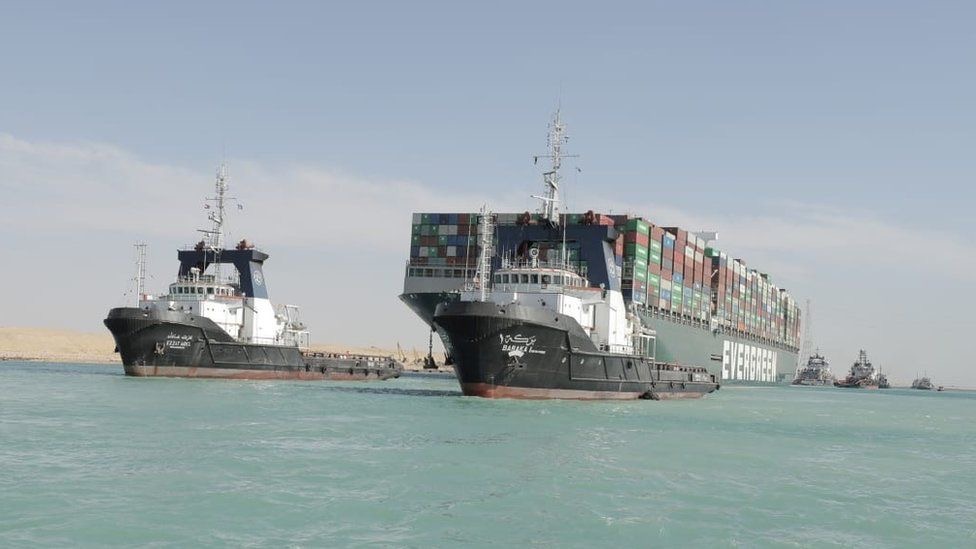Suez Canal Traffic Reopens After Stranded Giant Cargo Ship Blocking Waterway Gets Freed
 Traffic has resumed in Suez Canal after Ever Given, a massive container ship blocking the waterway for almost a week was finally freed by salvage crews, authorities said Monday.
Traffic has resumed in Suez Canal after Ever Given, a massive container ship blocking the waterway for almost a week was finally freed by salvage crews, authorities said Monday.
Suez Canal is an artificial sea-level waterway in Egypt, connecting the Mediterranean Sea to the Red Sea through Isthmus of Suez and dividing Africa and Asia.
Tug boats honked their horns in celebration as the 400m-long (1,300ft) named Ever Given was dislodged on Monday with the help of dredgers and tug boats.
The Ever Given is one of the largest container ships in the world. The 220,000-ton vessel is able to carry 20,000 containers, and stretching more than 1,300 feet.
Expert salvage crews were called in to help with the refloat operation. More than 10 tugboats were on the scene, as well as specialized dredging equipment. More than 20,000 tons of sand and mud were removed during the dredging operation.
Over the weekend, it was feared that some of the ship’s cargo of some 18,000 containers would have to be removed in order to lighten the load.
However, high tides helped the tugs and dredgers in their work and early on Monday, the stern (rear of the ship) was freed and the great ship swung across the canal, to shouts of celebration. Hours later, the bow (front) too came unstuck, and the Ever Given was able to move out with its tugs.
The ship, which ran aground last Tuesday, created disruptions in a global supply chain already straining under the ongoing impacts of COVID-19.
Hundreds of ships waited to pass through the canal which links the Mediterranean to the Red Sea via Egypt and it is one of the world’s busiest trade routes.
Around 12% of global trade passes through the Suez Canal. Lloyd’s List estimates that more than $9 billion worth of goods passes through the 120-mile waterway each day, translating to around $400 million per hour.
The crisis has forced companies to choose between waiting or rerouting vessels around Africa, which adds a huge fuel bill, 9,000 kilometres (5,500 miles) and over a week of travel to the trip between Asia and Europe.
Bernhard Schulte Shipmanagement, the technical manager of the ship, said last week that Ever Given ran aground due to heavy winds. Over the weekend, Suez Canal Authority Chairman, Osama Rabie said human or technical error may have played a role in the ship deviating from its course.
However, high tide also contributed to Monday’s successful re-floating. The ship’s refloating means traffic can resume in the Suez Canal. Nearly 19,000 ships passed through the canal during 2020, for an average of 51.5 per day, according to Suez Canal Authority.
More than 350 vessels are currently waiting on either side of the canal, according to estimates from Leth Agencies. This includes container ships, bulk carriers and oil tankers.
As the Ever Given remained lodged last week, some ship operators opted to re-route vessels, adding more than a week of additional sailing time, while also increasing fuel costs.
The breakthrough followed what appeared to be a setback and came moments after the ship had temporarily settled back into the diagonal position it had been stuck in after running aground last Tuesday.
On Sunday, Russia offered assistance to freed the massive ship, following other countries including the United States that made similar offers.
The vessel has now been towed to Great Bitter Lake, which sits between two sections of the canal to the north of where the ship got stuck. It will undergo safety checks.
It may take up to three days to clear the backlog of ships stuck at both ends of the canal, the Suez Canal Authority says.
Some ships have already left the region, preferring to take an alternative, longer route around the southern tip of Africa.
Inevitably, cargoes will be reaching their destination much later than planned. There may be congestion when they arrive in port, while future sailing schedules have been thrown into disarray.
The cost of shipping goods to Europe is expected to rise as a result, BBC Business Correspondent Theo Leggett reports.


